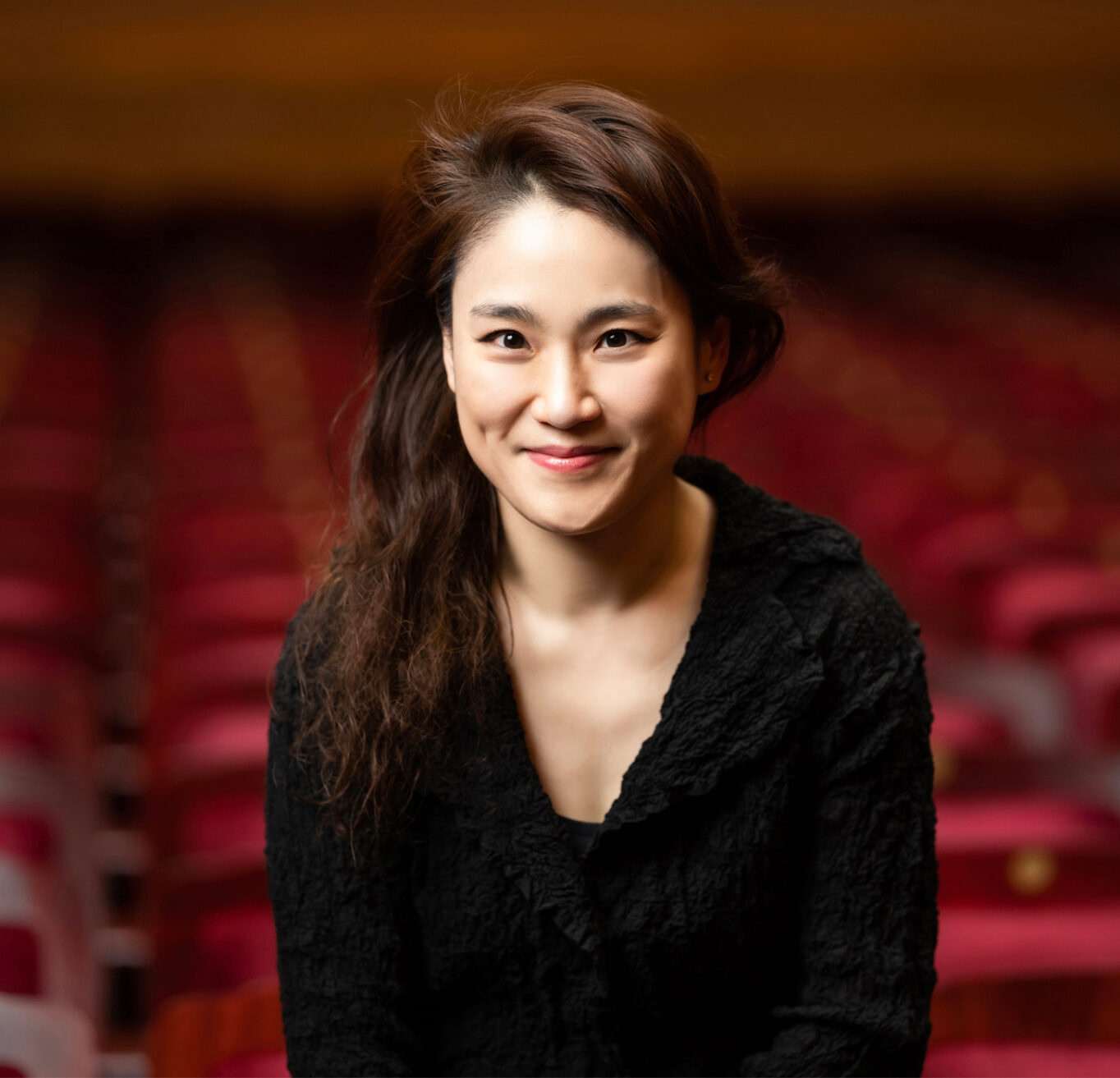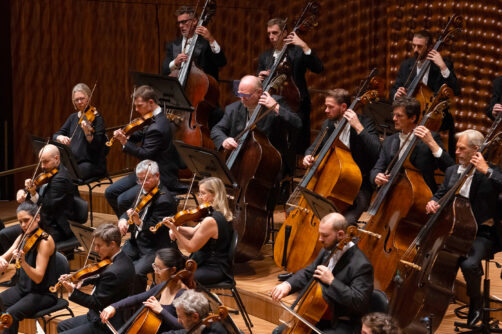
From Bow to Baton: Han-Na Chang Explores the Universe of Music
16 April, 2024
When she won the Rostropovich Cello Competition at age 11, a long career as soloist beckoned. But after going as far as she felt she could with her instrument, Han-Na Chang made the switch to conducting, and has never looked back.
By Hugh Robertson
The list of people who have made the leap from a career as an instrumental soloist to a successful conductor is very short. Australia has produced one significant name in Sir Charles Mackerras; we are also home to two more in Umberto Clerici and Jaime Martín. And at the absolute pinnacle are three of the great titans of twentieth-century music, stars immediately identifiable by their surname alone: Ashkenazy, Rostropovich, Barenboim.
To that exalted pantheon may soon be added Han-Na Chang.
Chang first came to international prominence in 1994 when she, as an 11-year old, sensationally won the Rostropovich Cello Competition. In the years following she had a career all cellists would dream of, studying with Mstislav Rostropovich, Mischa Maisky and Giuseppe Sinopoli, releasing award-winning recordings and performing with the world’s greatest orchestras – Berlin, London, Paris, New York, Los Angeles, Cleveland, Chicago, Boston, and more. Her three performances in Sydney as soloist are the stuff of which dreams are made: Tchaikovsky’s Rococo Variations with Lorin Maazel and Saint-Saëns’ Cello Concerto No.1 with Leonard Slatkin, both in July 2000, then another visit in August 2009, performing Shostakovich’s Cello Concerto No.1 with a young Yannick Nézet-Séguin.
But when Chang returns to Sydney it won’t be with bow in hand but rather baton, having changed disciplines to conductor and now rising through those ranks in much the same way she blazed across the cello firmament 30 years ago.
That may seem like a radical shift when your career is already going so well, but for Chang it was the only decision that made any sense.
‘The cello repertoire is very small, and what you get asked to play [as a soloist] is even smaller,’ says Chang from her New York apartment. ‘And having started so young, I felt like I needed to dig deeper into music, because there is this huge universe out there of symphonic music.’

Chang has been exploring all across that universe, and in May brings to Sydney a program of works that are close to her heart – with the centrepiece being Tchaikovsky’s Fifth Symphony. It is a remarkable work that demonstrates just why Tchaikovsky is held in such high regard, resplendent with melodies you will be whistling for days and orchestration that allows every instrument to shine.
‘I love Tchaikovsky,’ says Chang with a broad smile. ‘Who doesn’t, right?
‘It’s extraordinary that somebody who was so elegant and such a gentleman was always in turmoil inside. He was perfectly brought up as a gentleman speaking French, but was writing music of such drama. He is this poet of yearning and longing and con desiderio and passione – with desire and passion.’
Pyotr Ilyich Tchaikovsky (1840–1893) is ultimately a tragic figure despite the exquisite beauty of so much of his music. All his life he struggled greatly with depression, his personal life was punctuated with tragedy, and musically he was constantly being pulled back and forth between his formal, Western-oriented training and his innate Russianness, openly criticised by a cadre of Russian contemporaries known as the ‘Mighty Five’ for being too Western, and derided in the west for being too vulgar and Russian.
This struggle was clearly raging when Tchaikovsky was writing his Fifth Symphony. In a letter from 1888 he wrote down some ideas for a possible narrative for the work: “Intr[oduction]. Complete resignation before Fate – or, what is the same thing, the inscrutable designs of Providence.” Though he later wrote that he ultimately abandoned this narrative, it is hard not to hear this symphony as the fight against – and ultimate triumph over – fate: there is a musical theme (often interpreted as representing the composer himself, or a protagonist more broadly) that is stated in the first movement, undergoes all manner of changes and alterations, before finally concluding in triumph in the final bars.

‘This music is explosive, this Fifth Symphony,’ observes Chang. ‘It's a symphony of paradox. And it shows what a complex life that he was living inside. It’s music of anguish, and excitement, and hope, and despair, and more despair, and more despair, and trying to get out of despair and trying more and more. You get to that final movement and you can hear that he’s got his claws on this supposed fate, and you see the struggle that he must have felt in his heart. And how wonderful for us that he was able to channel all of that into music and share that with us.’
Chang believes that it is Tchaikovsky’s great sensitivity to his human weaknesses that makes him such a timeless and beloved composer – and she hopes he understood at least a little of his impact while he was alive.
‘I wonder if he even had an inkling of how much his music would actually move the heart of people living in the 21st century,’ she continues. ‘It’s so relevant, this personal feeling. We all have it – whatever the reason, everybody has it. And that is the power of great music, that it is able to touch what we have in all of us and inspire us and move us. It’s absolutely extraordinary what music can do.’
Tchaikovsky’s triumph over fate extends far beyond this symphony, past even this widespread personal connection that he is able to inspire nearly 150 years after his death. He also comprehensively won the argument about whether he was too Russian or too Western simply by being himself – and now is claimed by both schools of music with equal enthusiasm.
‘Now you look at that Mighty Five and the real symphonic genius was Tchaikovsky. He became the national school of Russia,’ says Chang, referencing the Soviet-era directives that all Russian composers should seek to emulate Tchaikovsky.
‘What a legacy. What a man. What an artist. What a real human being.’
This concert is an all-Russian program that opens with the sparkling overture to Ruslan and Ludmilla by Mikhail Glinka – ‘like a glass of champagne’ and ‘the perfect opener’, says Chang – as well as the extraordinary, virtuosic Second Piano Concerto by Prokofiev. Keep an eye out for an interview with Chang and soloist Behzod Abduraimov discussing this piece next week.
Chang has a particular affinity for Russian music thanks to her years studying and being mentored by Mstislav Rostropovich: following her victory at the cello competition that bears his name, Chang spent many years studying cello privately with Rostropovich, and in 1995, she made her debut recording with Rostropovich conducting the London Symphony Orchestra. Rostropovich was one of the greatest musicians of the 20th century, and had close relationships with several Soviet-era Russian composers, most notably Shostakovich and Prokofiev. Rostropovich had also studied at the Moscow Conservatory, the institution at which Tchaikovsky himself was the founding Professor of Music.
That makes Chang a link in a chain of teaching, mentorship and friendship that stretches back directly to Tchaikovsky and Prokofiev. But what would her old mentor – the man she affectionately calls ‘Slava’ – think of this program?
‘I think he would have loved it. He loved championing Russian music,’ says Chang with a smile. ‘There are two things that he told me that I always remember: the first is a quote from Shostakovich – apparently Shostakovich told Slava, ‘Never stop playing even if the people are throwing stones at you.’ And you hear all of that in the music of Shostakovich.
‘The second story is so famous that maybe you know it already. Slava wanted to be a composer, so he wrote some pieces and he brought a work to Prokofiev. Prokofiev looked at it and changed one note here, changed another note there – and suddenly the piece was different, and it became [a] Prokofiev [piece]. And that's when Slava decided to stop composing,’ says Chang with a laugh.
‘And that's just a wonderful link that I have through Slava to Russian music.’

Before we finish our conversation, I ask Chang what it is that ties the pieces in this concert together beyond the fact of the composers’ shared nationality – what is the idea that runs through the program?
She pauses a moment to consider.
‘Life is beautiful – no matter what. I think I would say that, actually.
‘Because the circumstances of the main works…through it all, through Prokofiev and Tchaikovsky, there is so much beauty in life. And out of so much pain, or out of so much suffering, such beauty can come.
‘I think that's probably what art is here for – great music, great paintings, great literary works. Nobody's life is what it seems on the facade. Everybody has his or her own story. But on whatever the circumstances, there's always the other side of the coin. And that's when art, music, poetry, beauty comes into life. And I think this music perfectly shows that what is beautiful about life is living it with all of your heart, and all of your soul, and giving everything you've got. That is life. And that is what makes life worth it and beautiful is that you give it all you have, that you are life. You are your life.
‘And Tchaikovsky for me is always so moving because he doesn't shy away from his issues.
'He faces every issue head on in his music. And this shows not only his strength, but how fragile he was – and yet he tries again, and he builds again for the next climax, for the next climax. And he goes again and again and again. He never gives up to the last note. And I think this shows the resilience of his spirit – and not only his spirit, but our spirit, because he was just a human being like all of us. It's a part of what we do every day in our lives.
‘So life is beautiful, really.’
Beautiful also is that thought that, nearly 150 years after Tchaikovsky sat down to write a symphony inspired by triumph over fate, it is his music that demonstrates his ultimate triumph. Through his music his spirit lives on, soaring up and over the Sydney Opera House Concert Hall, inspiring and touching other souls on the other side of the world from his homeland.

